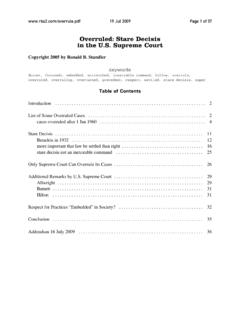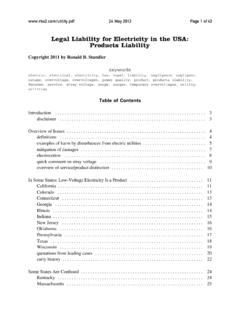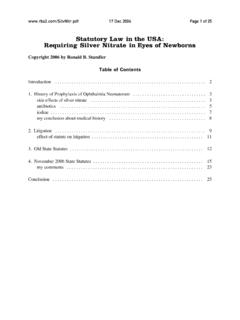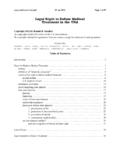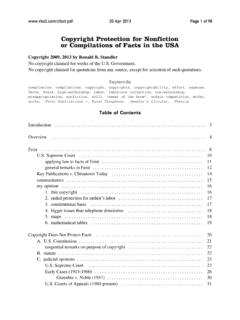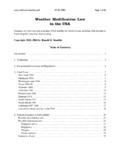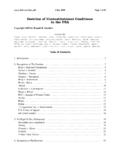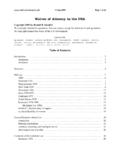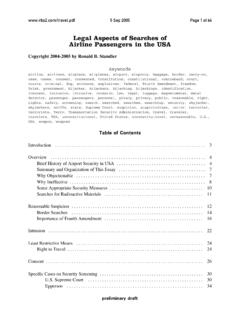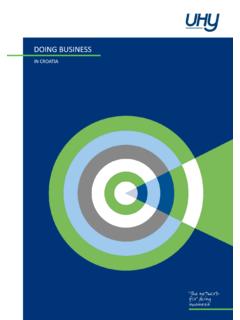Transcription of Common-Law Copyright in the USA
1 Jul 2013 Page 1 of 29 Common-Law Copyright in the USAC opyright 2013 by Ronald B. StandlerNo Copyright claimed for works of the Copyright claimed for quotations from any source, except for selection of such , Common-Law , conversation, Copyright , first publication, fixed, generalpublication, interview, law, lecture, limited publication, music, performance,perpetual, recording, transferTable of ContentsIntroduction .. 2 Overview .. 3after 1 Jan 1978 .. 4 History .. 5 Law Before Copyright Act of 1976 .. 5A. right of first publication .. 5B. Common-Law Copyright is perpetual.
2 9C. transfer of Common-Law Copyright .. 9D. general publication terminates Common-Law Copyright .. 10 limited publication does not terminate Common-Law Copyright .. 12public performance is limited publication .. 14delivery of lecture or speech is limited publication .. 15E. no preemption by Copyright Act of 1909 .. 17 Law After Copyright Act of 1976 .. 17preemption by Copyright Act of 1976 .. 18legislative history .. 19unfixed works .. 21 California Statute .. 22 Are Conversations or Interviews Copyrightable? .. 23 Music Recorded Before 15 Feb 1972.
3 Jul 2013 Page 2 of 29sale of recordings does not extinguish Common-Law Copyright .. 24pirated/bootleg recordings of music .. 26 Conclusion .. 28 Bibliography .. 28 IntroductionThe subject of this essay is the murky and poorly articulated Common-Law Copyright in theUSA. Even amongst specialists in intellectual property law ( , patents, trademarks, Copyright ,trade secrets) few lawyers understand Common-Law Copyright . Because lawyers who are arguingcommon-law Copyright cases are not doing adequate legal research, these lawyers do notadequately explain Common-Law Copyright to judges, which leads to confusing, conflicting, orerroneous judicial decisions.
4 Worse, some lawyers for plaintiffs do not recognize they have acommon-law Copyright case, fail to plead Common-Law Copyright , and attempt to get a remedyfrom some other legal theory that may be a poor fit to the facts of the essay presents general information about an interesting topic in law, but is not legaladvice for your specific problem. See my disclaimer at . From reading e-mail sent to me by readers of my essays since 1998, I am aware that readers oftenuse my essays as a source of free legal advice on their personal problem. Such use is notappropriate, for reasons given at .I list the cases in chronological order in this essay, so the reader can easily follow the historicaldevelopment of a national phenomenon.
5 If I were writing a legal brief, then I would use theconventional citation order given in the Bluebook. Jul 2013 Page 3 of 29 OverviewCopyright for published works in the USA has been according to a federal Copyright statute,since the first Copyright statute in the year the Copyright Act of 1976 became effective on 1 Jan 1978, unpublished works wereprotected by state law, known as Common-Law Copyright . Common-Law Copyright gave the authortwo principal legal rights: (1) the right to determine when and where the work would be firstpublished and (2) creating a property right that can be enforced by other legal theories, ,unfair competition or unjust enrichment.
6 My earlier essay, Ideas Not Copyrightable, (May 2009)explains that during the 1800s, publication of a work donated to the public domain any novel ideasin that work. In the 1900s, judges and the Copyright Act of 1976 simply say that copyrightdoes not protect ideas. The two views give the same (technically a general publication 1) automatically terminated the common -lawcopyright. When the owner of a Common-Law Copyright (typically the author) decided to publishthe work, the publisher included a Copyright notice on every copy and registered a statutorycopyright on the published work by submitting two copies to the Library of Congress and payingthe fee.
7 Registering a statutory Copyright on the published work continued Copyright protection the Common-Law Copyright was permanently extinguished upon publication, and the federalstatutory Copyright began with registration and affixing a Copyright notice to all published , the owner of a Common-Law Copyright on an unpublished work couldvoluntarily register an unpublished work under 11 of the Copyright Act of 1909, later 17 12 ( works not reproduced for sale ). Such registration would permanently extinguish thecommon-law Copyright , and substitute the then 28-year statutory Copyright (renewable for asecond term of 28 years) for the perpetual protection of Common-Law A general publication terminates Common-Law Copyright , but a limited publication does notterminate Common-Law Copyright .
8 See the discussion that begins on page 10, Jul 2013 Page 4 of 29 One work was never simultaneously protected by both Common-Law Copyright and Acceptance of federal statutory Copyright permanently extinguished the common -lawcopyright on that Publication without the formalities of federal statutory copyrightextinguished forever both the Common-Law Copyright and the statutory Copyright : (1) publicationextinguished Common-Law Copyright , and (2) either failure to include a Copyright notice onpublished copies, failure to deposit two copies at the Copyright Office, or failure to register thecopyright extinguished the federal statutory Copyright .
9 Infringement of a Common-Law Copyright was typically litigated in state court, but if somerules of civil procedure were satisfied a Common-Law Copyright could also be litigated in federalcourt. In contrast, infringement of a federal statutory Copyright is always litigated in federal 1338(a). after 1 Jan 1978 The Copyright Act of 1976 automatically applies to all original works of authorship [thatare] fixed in any tangible medium of expression . 17 102(a) (effective 1 Jan 1978). Theword fixed means written on paper, recorded on magnetic tape or disk, recorded on photographicfilm, recorded in a digital data file in any format on any medium, etc.
10 The concept of fixed createsa boundary between (1) ephemeral or transient expression ( , a performance, lecture, speech)and (2) a permanent and stable record of the expression ( , book, periodical, vinyl gramophonerecord, compact disk, computer file, etc.)2 Caliga v. Inter Ocean Newspaper Co., 157 F. 186, 188-189 (7thCir. 1907) ( Thus the benefits ofthe statute are substituted for the imperfect benefits of the Common-Law ownership by his surrender ofthe perpetual right to withhold from publication. These rights are separate and not coexistent. Thecommon-law right ends when the statutory right begins. Holmes v. Hurst, 174 82, 85, 19 , 43 904; Bobbs-Merrill Co.)

